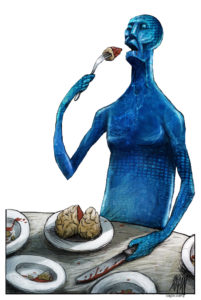On Art and Politics: A Letter to the Millennials
There is a sense in which art, politics and economics are all inextricably and symbiotically tied together, but history has proven to us that art serves as a powerful corrective against the dangers of the establishment. Shutterstock
Shutterstock
Editor’s note: This essay is an address to students by Jonathan Taplin, clinical professor at the University of Southern California’s Annenberg School for Communication and Journalism and director of the USC Annenberg Innovation Lab. It was first published on Medium.
So we are about to embark on a sixteen-week exploration of innovation, entertainment, and the arts. This course is going to be about all three, but I’m going to start with the “art” part—because without the art, no amount of technological innovation or entertainment marketing savvy is going to get you to go to the movie theater.
However, I think there’s also a deeper, more controversial claim to be made along these same lines: Without the art, none of the innovation matters—and indeed, it may be impossible—because the art is what gives us vision, and what grounds us to the human element in all of this. Although there will be lectures, during which I’ll do my best to share what I’ve learned about the way innovation, entertainment and the arts fit together, the most crucial part of the class is the dialogue between us, and specifically the insights coming from you as you teach me about your culture and your ideals.
The bottom line is that the world has come a long way, but from my perspective, we’re also living in uniquely worrisome times. My generation had dreams of how to make a better life that have remained woefully unfulfilled (leaving many of us cynical and disillusioned), but at the same time your generation has been saddled with the wreckage of our attempts and are now facing what may seem to be insurmountable odds.
I’m writing this letter in the hopes that it will help set the stage for a truly cross-generational dialogue over the next sixteen weeks, in which I help you understand the contexts and choices that have brought us where we are today, and in which you help me, and one another, figure out the best way to move forward from here.
When I was your age, I had my heart broken and my idealism challenged multiple times by the assassinations of my political heroes: namely, John and Bobby Kennedy and Martin Luther King. Many in my generation turned away from politics and found our solace in works of art and entertainment. So one of the things I want to teach you about is a time from 1965–1980 when the artists really ruled both the music and the film industries. Some said “the lunatics had taken over the asylum” (and, amusingly enough, David Geffen named his record company Asylum), but if you look at the quality of work that was produced, it was extraordinary; in fact, most of it is still watched and listened to today. Moreover, in that period the most artistic work also sold the best: The Beatles’ “Sgt. Pepper” was without doubt the best record of the year but also the best selling, and “The Godfather” was similarly both best movie of the year and the biggest box office hit.
That’s not happening right now, and I want to try to understand why that is. I want to explore, with you, what the implications of this shift might be, and whether this represents a problem. It may be that those fifteen years your parents and I were lucky enough to experience was one of those renaissance moments that only come along once every century, so perhaps it’s asking too much to expect that I’ll see it occur again in my lifetime. Nevertheless, I do hope it happens at least once in yours.
I spoke of the heartbreak of political murder that has permanently marked me and my peers, but we have also been profoundly disappointed by politics’ failure to improve the lives of the average citizen. In 1969, the median salary for a male worker was $35,567 (in 2012 dollars). Today, it is $33,904. So for 44 years, while wages for the top 10% have continued to climb, most Americans have been caught in a “Great Stagnation,” bringing into question the whole purpose of the American capitalist economy (and, along the way, shattering our faith in the “American Dream”). The Reagan-era notion that what benefited the 1%—“the establishment”—would benefit everyone has by now been thoroughly discredited, yet it seems that we are still struggling to pick up the pieces after this failed experiment.
Seen through this lens, the savage partisanship of the current moment makes an odd kind of sense. What were the establishment priorities that moved inexorably forward in both Republican and Democratic administrations? The first was a robust and aggressive foreign policy. As Stephen Kinzer wrote about those in power during the 1950s, “Exceptionalism—the view that the United States has a right to impose its will because it knows more, sees farther, and lives on a higher moral plane than other nations—was to them not a platitude, but the organizing principle of daily life and global politics.”
From Eisenhower to Obama, this principle has been the guiding light of our foreign policy, bringing with it annual defense expenditures that dwarf those of all the world’s major powers combined. The second principle of the establishment was that “what is good for Wall Street is good for America.” Despite Democrats’ efforts to paint the GOP as the party of Wall Street, one would only have to look at the track record of Clinton’s treasury secretaries, Robert Rubin and Lawrence Summers (specifically, their zealous efforts to kill the Glass-Steagall Act and deregulate the big banks and the commodities markets), to see that both major parties are guilty of sucking up to money; apparently, the establishment rules no matter who is in power.
Was it any surprise, then, that Obama appointed the architects of bank deregulation, Summers and Timothy Geithner, to clean up the mess their policies had caused? Was it any surprise that they failed? Was it any surprise that establishment ideas about the surveillance state were not challenged by Obama? The good news is that, as a nation, we have grown tired of being the world’s unpaid cop, and we are tired of dancing to Wall Street’s tune. Slowly, we are learning that these policies may benefit the 1%, but they don’t benefit the people as a whole. My guess is the 2016 election may be fought on this ground, and we may finally begin to see real change, but the fact remains that we—both your generation and mine—are right now deeply mired in the fallout of unfulfilled promises and the failures of the political system.So this is the source of boomer disillusionment. But even if we are cynical about political change, we can try to imagine together a future where great artistic work continues to flourish; this, then, is the Innovation and Entertainment part of the course. It’s not that I want you to give up on politics—in fact the events of the last few weeks in Ferguson only reinforce my belief that when people disdain politics, their anger gets channeled into violence. But what I do want you to think about is that art and culture are more plastic—they can be molded and changed easier than politics.
There is a sense in which art, politics, and economics are all inextricably and symbiotically tied together, but history has proven to us that art serves as a powerful corrective against the dangers of the establishment. There is a system of checks and balances in which, even though the arts may rely on the social structures afforded by strong economic and political systems, artists can also inspire a culture to move forward, to reject the evils of greed and prejudice, and to reconnect to its human roots.
If we are seeking a political and economic change, then, an authentic embrace of the arts may be key. Part of your role as communication scholars is to look more closely at the communication surrounding us and think critically about the effects it is having, whose agenda is being promoted,and whether that’s the agenda that will serve us best. One of the tasks we’ll wrestle with in this class will be how we can get the digital firehose of social media to really support artists, not just brands.
In 2011, the screenwriter Charlie Kaufman (“Being John Malkovich,” “Adaptation”) gave a lecture at the British Film Institute. He said something both simple and profound:
People all over the world spend countless hours of their lives every week being fed entertainment in the form of movies, TV shows, newspapers, YouTube videos and the Internet. And it’s ludicrous to believe that this stuff doesn’t alter our brains.
It’s also equally ludicrous to believe that—at the very least—this mass distraction and manipulation is not convenient for the people who are in charge. People are starving. They may not know it because they’re being fed mass produced garbage. The packaging is colorful and loud, but it’s produced in the same factories that make Pop Tarts and iPads, by people sitting around thinking, “What can we do to get people to buy more of these?”
And they’re very good at their jobs. But that’s what it is you’re getting, because that’s what they’re making. They’re selling you something. And the world is built on this now. Politics and government are built on this, corporations are built on this. Interpersonal relationships are built on this. And we’re starving, all of us, and we’re killing each other, and we’re hating each other, and we’re calling each other liars and evil because it’s all become marketing and we want to win because we’re lonely and empty and scared and we’re led to believe winning will change all that. But there is no winning.
I think Charlie is right. People are starving, so we give them bread and circuses.
But I think Charlie is wrong when he says “there is no winning”. In fact I think we are really in a “winner-take-all” society. Look at the digital pop charts. 80% of the music streams are for 1% of the content. That means that Jay-Z and Beyoncé are billionaires, but the average musician can barely make a living. Bob Dylan’s first album only sold 4,000 copies. In this day and age, he would have been dropped by his label before he created his greatest work.
A writer I greatly admired, Gabriel García Márquez, died recently. For me, Márquez embodied the role of the artist in society, marked by the refusal to believe that we are incapable of creating a more just world. Utopias are out of favor now. Yet Márquez never gave up believing in the transformational power of words to conjure magic and seize the imagination. The other crucial aspect of Márquez’s work is that he teaches us the importance of regionalism. In a commercial culture of sameness where you can stroll through a mall in Shanghai and forget that you’re not in Los Angeles, Marquez’s work was distinctly Latin American. His work was as unique as the songs of Gilberto Gil, or the cinema of Alejandro González Iñárritu.
In a cultural like ours that has so long advocated a “melting pot” philosophy that papers over our differences, it is valuable to recognize that there is a difference between allowing our differences to serve as barriers and appreciating the things that make each culture unique, situated in time and space and connected to its people. What’s more, young artists also need to have the sense of history that Marquez celebrated when he said, “I cannot imagine how anyone could even think of writing a novel without having at least a vague of idea of the 10,000 years of literature that have gone before.” Cultural amnesia only leads to cultural death.With these values in mind, my hope is to lead you in a discussion of politics and culture in the context of 250 years of America’s somewhat utopian battle to build “a city on a hill.” I think many in my generation had this utopian impulse (which is, it should be observed, different than idealism), but it is slipping away like a short-term memory. I did not aspire to be that professor who quotes Dr. King, but I feel I must. He said the night before he was assassinated, “I may not get there with you, but I believe in the promised land.”
My generation knew that the road towards a better society would be long, but we hoped our children’s children might live in that land, even if we weren’t able to get there with you. It may take even longer than we imagined, but I know your generation believes in justice and equality, and that fills me with hope that the dream of some sort of promised land is not wholly lost. The next step, then, is to figure out how to work together, to learn from the past while living in the present moment in order to secure a better future, and I believe this class offers us an incredible opportunity to do precisely that.
So what are the skills that we can develop together in order to open a real cross-generational dialogue? First, I would hope we would learn to improvise. I want you to challenge me, just as I encourage and challenge you. Improvisation means sometimes throwing away your notes and just responding from your gut to the ideas being presented. It takes both courage and intelligence, but I’m pretty sure you have deep stores of both qualities, which will help you show leadership both in class and throughout the rest of your life. Leadership is more than just bravery and intellect, however; it also requires vulnerability and compassion, skills that I hope we can similarly cultivate together.
I want you to know that I don’t have all the answers—and, more importantly, I know that I don’t have all the answers. I am somewhat confused by our current culture, and I am looking to you for insight. You need to have that same vulnerability with your peers, and you also need to treat them with compassion as you struggle together to understand this new world of disruption. I know these four elements—courage, intelligence, vulnerability, and compassion—may seem like they are working at cross-purposes, but we will need all four qualities if we are to take on the two tasks before us.
One of our tasks is to try to restore a sense of excellence in our culture—the belief that great art and entertainment can also be popular. The second task is for baby-boomer parents and their millennial children to form a natural political alliance going forward. As I’ve said, I don’t think the notion that we will get to “the promised land” is totally dead, and with your energy and the tools of the new media ecosystem to help us organize, we can keep working towards a newly hopeful society, culture and economy, in spite of the mess we have left you with.
This is, at least, the plan. Of course, as the great critic James Agee once said, “Performance, in which the whole fate and terror rests, is another matter.”
Your support matters…Independent journalism is under threat and overshadowed by heavily funded mainstream media.
You can help level the playing field. Become a member.
Your tax-deductible contribution keeps us digging beneath the headlines to give you thought-provoking, investigative reporting and analysis that unearths what's really happening- without compromise.
Give today to support our courageous, independent journalists.






You need to be a supporter to comment.
There are currently no responses to this article.
Be the first to respond.